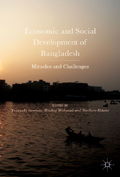Economic and Social Development of Bangladesh: Miracle and Challenges

Bangladesh has achieved remarkable development progress despite significant challenges, including weak governance and political instabilities, inequality, negative repercussions associated with rapid urbanization, and exposure to natural disasters. This recent economic and social development in Bangladesh can also be termed a “miracle.”
Since 1973, just two years after Bangladesh achieved independence, the Japan International Cooperation Agency (JICA) has supported the country’s development in a wide range of areas, using Japanese ODA tools such as technical cooperation, loans, grants, and Japan Overseas Cooperation Volunteers.
This book explores the factors affecting the development of Bangladesh based on empirical analysis. The volume is the culmination of a three-year research project entitled “Empirical Study on Risk and Poverty in Bangladesh,” conducted by the JICA Research Institute (JICA-RI). Two of the book’s editors, Yasuyuki Sawada (former JICA-RI visiting fellow and Professor, Faculty of Economics, the University of Tokyo) and Minhaj Mahmud (JICA-RI visiting scholar and Senior Research Fellow, Bangladesh Institute of Development Studies), played leading roles in this project.
The authors attribute the country’s successful development transformation to three country-specific mechanisms: the penetration of microfinance institutions (MFIs) and other non-government organizations (NGOs) into rural communities that led to relaxed credit and other binding constraints on rural poor households;
the development of the ready-made garment industry, resulting in the rapid transformation of the economy from an agriculture-based to an industry-oriented one; and significant investments in infrastructure, particularly in roads and bridges, which has helped to connect the formerly fragmented spatial economy.
While shedding light on the key driving forces such as private firms, NGOs, MFIs, and women who have started to participate in the economic spheres of the country, this book also focuses on the challenges in building resilience against unsustainable urbanization, economic and political risks, and disasters.
scroll